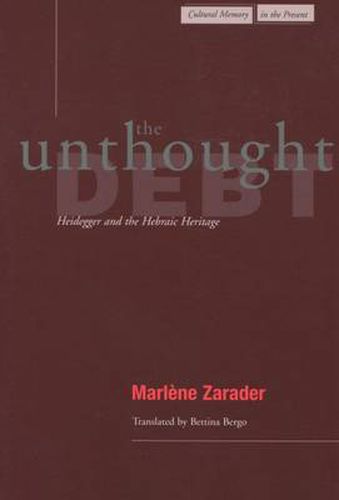Readings Newsletter
Become a Readings Member to make your shopping experience even easier.
Sign in or sign up for free!
You’re not far away from qualifying for FREE standard shipping within Australia
You’ve qualified for FREE standard shipping within Australia
The cart is loading…






Drawing on Heidegger’s corpus, the work of historians and biblical specialists, and contemporary philosophers like Levinas and Derrida, Zarader brings to light the evolution of an impense-or unthought thought-that bespeaks a complex debt at the core of Heidegger’s hermeneutic ontology.
Zarader argues forcefully that in his interpretation of Western thought and culture, Heidegger manages to recognize only two main lines of inheritance: the Greek line of philosophical thinking, and the Christian tradition of faith. From this perspective, Heidegger systematically avoids any explicit or meaningful recognition of the contribution made by the Hebraic biblical and exegetical traditions to Western thought and culture. Zarader argues that this avoidance is significant, not simply because it involves an inexcusable historical oversight, but more importantly because Heidegger’s own philosophical project draws on and develops themes that appear first, and fundamentally, within the very Hebraic traditions that he avoids, betraying an unthought debt to Hebraic tradition.
$9.00 standard shipping within Australia
FREE standard shipping within Australia for orders over $100.00
Express & International shipping calculated at checkout
Drawing on Heidegger’s corpus, the work of historians and biblical specialists, and contemporary philosophers like Levinas and Derrida, Zarader brings to light the evolution of an impense-or unthought thought-that bespeaks a complex debt at the core of Heidegger’s hermeneutic ontology.
Zarader argues forcefully that in his interpretation of Western thought and culture, Heidegger manages to recognize only two main lines of inheritance: the Greek line of philosophical thinking, and the Christian tradition of faith. From this perspective, Heidegger systematically avoids any explicit or meaningful recognition of the contribution made by the Hebraic biblical and exegetical traditions to Western thought and culture. Zarader argues that this avoidance is significant, not simply because it involves an inexcusable historical oversight, but more importantly because Heidegger’s own philosophical project draws on and develops themes that appear first, and fundamentally, within the very Hebraic traditions that he avoids, betraying an unthought debt to Hebraic tradition.